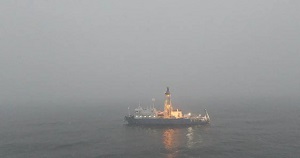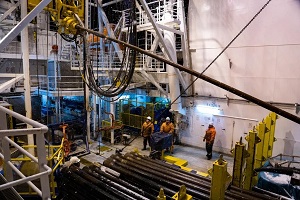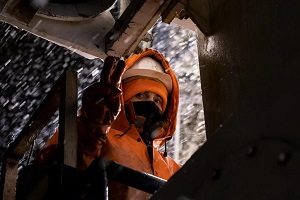Please activate JavaScript in your browser to use all interface options.
Rosneft Conducts Stratigraphic Drilling on Arctic Shelf
26 November 2020 |
| Photo Credit: Discovery Channel Russia |
Rosneft Oil Company has been the first in the history of Arctic surveys to drill shallow stratigraphic wells in the north of the Kara Sea. The work has been carried out during its vast research expedition. The project’s main task was to collect core samples. The core is a valuable rock material, a direct source of geological data required to determine the age (stratification), composition and conditions of formation for Arctic shelf rocks under research. The samples recovered are of great interest for the purpose of obtaining the latest data on the geological structure and oil and gas potential of the North-Kara basin.
 |
| Photo Credit: Discovery Channel Russia |
Rosneft Oil Company is the largest license holder for continental shelf areas. The Company is implementing a comprehensive long-term research programme in the Arctic, which includes geological, oceanological, hydrometeorological and environmental studies.
The North-Kara drilling was performed with the Bavenit survey drill ship, one of the most equipped vessels in Russia. During the expedition, eight wells were drilled to a depth of 90 m. Those were the first in the region and the northernmost on the Russian shelf. The fieldwork was carried out in compliance with the highest standards of environmental safety and environmental protection. In total, 6.5 tonnes of core were sampled, and the drilling technology was tested in deposits with varying properties, such as rocky terrigenous and carbonate ones, as well as in more challenging dispersion and semi-core deposits. Specially designed drill bits were used for rocky and semi-rocky formations.
 |
| Photo Credit: Discovery Channel Russia |
The core samples taken will be lab-tested by means of Innopraktika and the Lomonosov Moscow State University Faculty of Geology. A series of analytical studies will improve the reliability of forecasts of the oil and gas potential of the Arctic’s sedimentary basins of varying ages and provide a new geological model of the North-Kara region.
The experience gained during the expedition provides the basis to develop technologies for effective study of the Arctic shelf and to continue the project in the increasingly severe conditions of the Eastern Arctic.
Note for Editors:
Rosneft Oil Company’s offshore operations are of paramount importance for the future of modern Russia, ensuring the sustainable social and economic development of the country, supporting the modernisation of industry and the organisation of production of high-tech robotised equipment, upgrading coastal and transport infrastructure and developing human resources.
As a reliable user of natural resources, Rosneft has a large-scale environmental agenda for the Arctic. The Company is implementing an Arctic Biodiversity Conservation Programme, which includes monitoring and research on key animal species that are indicative of the resilience of the northern ecosystem. Unique studies of walruses and polar bears have been conducted in the waters of the Kara and Barents Seas and the Franz Josef Land archipelago in 2020.
Rosneft
Information Division
November 26, 2020

-315xx70.png)

